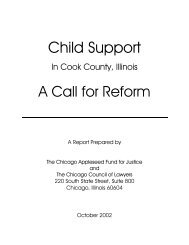Videoconferencing in Removal Hearings: A Case Study of the ...
Videoconferencing in Removal Hearings: A Case Study of the ...
Videoconferencing in Removal Hearings: A Case Study of the ...
Create successful ePaper yourself
Turn your PDF publications into a flip-book with our unique Google optimized e-Paper software.
held <strong>in</strong> one jurisdiction and <strong>the</strong> court is <strong>in</strong> ano<strong>the</strong>r), ignor<strong>in</strong>g most <strong>of</strong> <strong>the</strong> issues discussed<br />
<strong>in</strong> our study. Judges receive no tra<strong>in</strong><strong>in</strong>g specific to videoconferenc<strong>in</strong>g. Currently<br />
videoconferenc<strong>in</strong>g is used <strong>in</strong>consistently throughout <strong>the</strong> country: some courts use<br />
videoconferenc<strong>in</strong>g for Master Calendar and merits hear<strong>in</strong>gs, o<strong>the</strong>rs just use<br />
videoconferenc<strong>in</strong>g for Masters Calendar hear<strong>in</strong>gs, and some courts do not use<br />
videoconferenc<strong>in</strong>g at all. Given how much is at stake, EOIR should provide more<br />
guidance to Immigration Judges. Such guidance will not only enhance <strong>the</strong> efficiency and<br />
fairness <strong>of</strong> videoconferenc<strong>in</strong>g, but will make its use more consistent.<br />
Recommendation: EOIR should issue comprehensive regulations concern<strong>in</strong>g<br />
videoconferenc<strong>in</strong>g. (Some <strong>of</strong> <strong>the</strong> recommendations that follow this one focus on areas<br />
where rulemak<strong>in</strong>g is especially needed.) The judges, court personnel, and attorneys who<br />
participate <strong>in</strong> videoconferenc<strong>in</strong>g should be tra<strong>in</strong>ed <strong>in</strong> <strong>the</strong>se standards. EOIR should tra<strong>in</strong><br />
its judges and clerks; ICE should tra<strong>in</strong> <strong>the</strong> trial attorneys; and bar associations should<br />
tra<strong>in</strong> immigrant defenders.<br />
3. Allow<strong>in</strong>g immigrants to opt out <strong>of</strong> videoconferenc<strong>in</strong>g <strong>in</strong> cases where <strong>the</strong>ir<br />
substantive rights are at stake<br />
Literature concern<strong>in</strong>g videoconferenc<strong>in</strong>g <strong>in</strong> o<strong>the</strong>r contexts suggests its power to<br />
distort credibility judgments and negatively impact “remote” litigants. This aspect <strong>of</strong><br />
videoconferenc<strong>in</strong>g is especially problematic <strong>in</strong> <strong>the</strong> immigration context. Immigrants are<br />
<strong>of</strong>ten <strong>in</strong>digent, non-English speakers, <strong>of</strong> m<strong>in</strong>ority ethnicities or races. Many <strong>of</strong> <strong>the</strong>m have<br />
just arrived <strong>in</strong> <strong>the</strong> United States and have no knowledge <strong>of</strong> our court system. In some<br />
cases, <strong>the</strong>y have recently escaped persecution and torture. Unaccompanied immigrant<br />
m<strong>in</strong>ors are especially vulnerable. In general, deta<strong>in</strong>ed clients face much greater obstacles<br />
<strong>in</strong> locat<strong>in</strong>g counsel, prepar<strong>in</strong>g, and present<strong>in</strong>g <strong>the</strong>ir cases than non-deta<strong>in</strong>ed clients, who<br />
52




